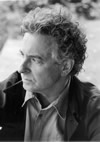- Guest Poets
- Poems by Clive James
- Recent Poems
- Poetry Collections
- Divine Comedy
- Back from the Web
- Articles on Poetry
- Lyrics
 Born in 1955 in Surrey and brought up in London, Alan Jenkins was educated at the University of Sussex, and since 1981 has worked for the TLS, first as poetry and fiction editor and lately as deputy editor. During all this time his reputation has been growing inexorably, until now he can be said to dominate his generation. Most of the poets that one likes can be said to be doing that, but Alan Jenkins really does have an unusual degree of authority, at least partly derived from his determination to back up even the most anarchic thematic boldness with a scrupulously formal structure. In reporting the details of his own emotional life, for example, he has a justifiable confidence that he speaks for all of us: here the boldness is not just in the way he reports his love affairs, but in the way he registers his love for his mother, striking deep notes of grief that make other poets attempting a similar theme sound as if they are holding violins while he has been issued with the only cello. In this as in other respects he has never seemed to fit in with any readily recognizable career path for British poets. His background has boats in it, and they aren’t yachts: how many poets know their way around a proper working boat? And where does he stand in relation to the vanished Empire? His opinion seems ambivalent, like Larkin’s, yet his tone is all his own, and, typically, full of confident music. “Men were employed to keep the Empire going/In distant, dark-skinned places... where the sun was not allowed to set.” Since 1988, when he made his debut with Hot-House, he has published a good half dozen slim volumes which have been honoured with too many critical hosannas and prize-committee short-listings to be recorded here, although one owes it to Greenheart (1990) to say that it received the Forward Poetry Prize for the best collection of that year. For an introduction, a useful new-and-collected volume, A Short History of Snakes, came out in 2001, and since then there has been A Shorter Life (2005). The combination of fluency and high quality would be daunting if the charm of his line were not so understated: as things are, he makes unfailing wit seem like the only way to say it.
Born in 1955 in Surrey and brought up in London, Alan Jenkins was educated at the University of Sussex, and since 1981 has worked for the TLS, first as poetry and fiction editor and lately as deputy editor. During all this time his reputation has been growing inexorably, until now he can be said to dominate his generation. Most of the poets that one likes can be said to be doing that, but Alan Jenkins really does have an unusual degree of authority, at least partly derived from his determination to back up even the most anarchic thematic boldness with a scrupulously formal structure. In reporting the details of his own emotional life, for example, he has a justifiable confidence that he speaks for all of us: here the boldness is not just in the way he reports his love affairs, but in the way he registers his love for his mother, striking deep notes of grief that make other poets attempting a similar theme sound as if they are holding violins while he has been issued with the only cello. In this as in other respects he has never seemed to fit in with any readily recognizable career path for British poets. His background has boats in it, and they aren’t yachts: how many poets know their way around a proper working boat? And where does he stand in relation to the vanished Empire? His opinion seems ambivalent, like Larkin’s, yet his tone is all his own, and, typically, full of confident music. “Men were employed to keep the Empire going/In distant, dark-skinned places... where the sun was not allowed to set.” Since 1988, when he made his debut with Hot-House, he has published a good half dozen slim volumes which have been honoured with too many critical hosannas and prize-committee short-listings to be recorded here, although one owes it to Greenheart (1990) to say that it received the Forward Poetry Prize for the best collection of that year. For an introduction, a useful new-and-collected volume, A Short History of Snakes, came out in 2001, and since then there has been A Shorter Life (2005). The combination of fluency and high quality would be daunting if the charm of his line were not so understated: as things are, he makes unfailing wit seem like the only way to say it.